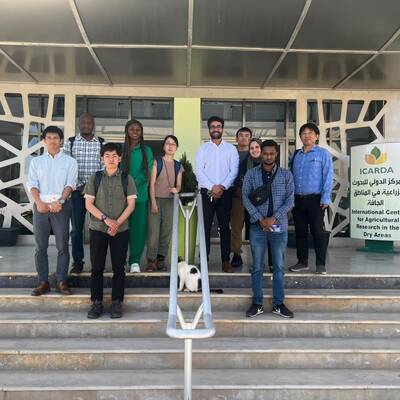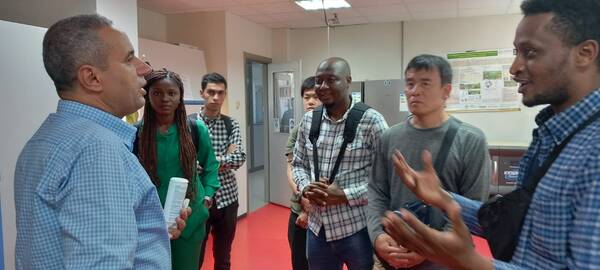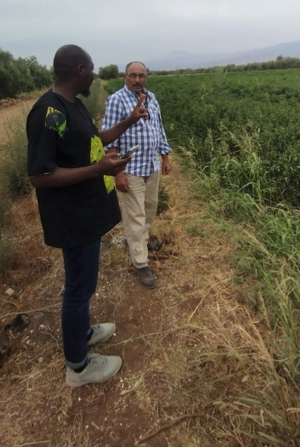Building Resilient Agriculture Systems with Young Professionals

International Youth Day is an annual opportunity to reflect on young professionals’ contributions to shaping a sustainable future. This year’s theme, “Green Skills for Youth,” highlights the critical role of technical knowledge, values, and attitudes in enabling environmentally conscious decisions.
Supporting young scientists in their professional development is a key pillar of ICARDA’s strategy to bring in fresh ideas and innovation that will support the transformation of food, land, and water systems for sustainability and resilience in the face of intensifying climate change.
One such young professional is Muhammed Dayyabu, a Nigerian student at Tottori University in Japan. Through our partnership with Tottori University, students in Japan can now explore ICARDA’s leading agri-innovations that benefit drylands communities in the CWANA region and beyond.
Tottori University is renowned for its research on the nearby and unique Tottori Sand Dunes focuses on drylands research for developing countries, making it Japan’s top-level research and education center on this topic.

In a Q&A with ICARDA, Muhammed shares his journey and ambitions in agriculture. Muhammed’s research on water delivery performance and productivity is particularly relevant to Nigeria, his home country, which faces increasing water scarcity in a semi-dry climate.
-
How is Nigeria different to Japan, where you are currently studying?
MD: It is quite a contrast between a semi-dry region with increasingly unpredictable rainy and dry seasons to a country with abundant rainfall and four distinct seasons. I must admit, it has been fascinating to witness the changing colors of the leaves and the snowfall during winter. Japan is also a highly developed country with a vibrant and dynamic environment, and being here has opened my eyes to a whole new world of opportunities and experiences.
-
What is Tottori University’s connection to ICARDA?
MD: Tottori University and ICARDA have a strong long-lasting partnership in dryland agriculture. As part of this collaboration, Japanese students can visit ICARDA’s research facilities and learn about the latest advancements in dryland agriculture while ICARDA scientists visit and give lectures at Tottori University. I was one of the selected students who got to be part of a team that visited Morocco and ICARDA’s research stations there. It was a very informative experience, and I learned so much from the experts in the field. It’s incredible to see universities and research organizations on different sides of the world coming together to drive innovation and sustainability in agriculture.
-
What is the focus of your study, and how does it relate to your country and the future of agriculture under climate change?
MD: I am studying the interaction between water delivery performance and water productivity. As someone who has worked in the irrigation department "Federal Ministry of Water Resources (FMWR), Abuja, Nigeria.", I have seen firsthand the importance of developing efficient irrigation systems. My supervisor suggested that I focus on Morocco for my case study, as it has similar dry conditions to Nigeria but is even more affected by climate change because of its acute water scarcity. I saw that being able to explore ICARDA’s water innovations in dryland agriculture as an opportunity I couldn’t pass up.

-
How do you plan to apply what you have learned from your studies and research with ICARDA to tackle Nigeria’s current climate crisis challenges?
MD: I am genuinely impressed by ICARDA’s research, and I believe it should be expanded globally to benefit other dry climate regions. Given the ever-decreasing water supply in Nigeria, I plan to advocate for sustainable water usage and inform farmers about ways to improve their practices and agricultural management systems. Improving water adequacy and reaching sustainable use of water and crops are key to increasing the productivity of the agriculture sector during the climate crisis.
-
What green skills do you believe are necessary to develop in your career toward a sustainable future?

MD: One of the essential green skills for a sustainable agricultural future is greenhouses technology. When used correctly, it can help grow different crops, extend growing seasons, improve crop yields, reduce the use of fertilizers and pesticides, minimize water wastage, and conserve soil. It’s a very productive and sustainable technique that can significantly impact agriculture
-
How do you plan on bringing the knowledge you have gained back home?
MD: As an irrigation specialist, I plan to use the knowledge I have gained to become an advocate for sustainable water usage in my country. Given the declining water supply, I will educate farmers in my home country about ways to improve their practices and agricultural management systems. I also plan to explain climate change to farmers who may not understand it and help them navigate through related problems.
I would also like to thank ICARDA and Tottori University for this opportunity. I am proud to be an ambassador for agricultural research for my country.
Muhammed Dayyabu, P.h.D Student, Tottori University (Japan)
-----
It is essential to recognize the potential of young professionals like Muhammed in shaping the future of science and agriculture. ICARDA believes in investing in the next generation and passing on knowledge and expertise to empower youth to contribute to agricultural innovation and promote sustainability. Together, we can build resilient livelihoods for farmers in dryland regions and beyond, creating a more sustainable and equitable future for all.
